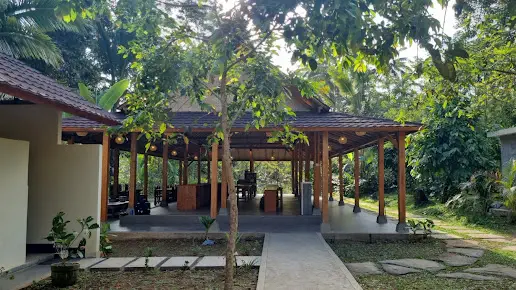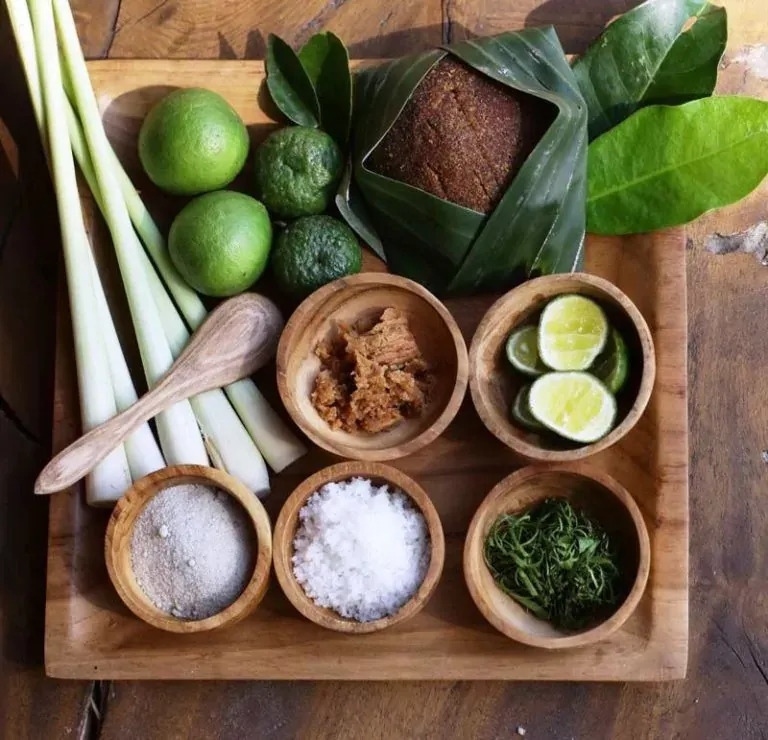Introduction
Discover the Secrets of Balinese Cuisine “Bali” an island province of Indonesia, is famous for its vibrant culture, stunning landscapes, and delicious cuisine. Balinese food is based on the ancient traditions of the island, with creative Balinese cooking arts and a deep spiritual understanding of food and how to prepare it.
Balinese food culture is based on a deep cultural and spiritual understanding of ancient cooking skills and motivations that are unique to the island.
The Balinese approach to food is to live in complete culinary and philosophical harmony with nature, as they build, labor, and cook only to please and honor their gods.
The island’s volcanic soil and tropical climate provide a rich agricultural environment with an abundance of exotic fruits, vegetables, herbs, and spices that are unique to the region.
→ Immerse yourself in the sights, sounds, and aromas of our state-of-the-art hands-on cooking in “Cooking Class Ubud”
→ Our Food Guide For “Must Try” Traditional Balinese Food During Your Holiday in Bali
Balinese food has a wide range of dishes with strong flavors, exotic spices, and fresh ingredients, such as fresh seafood, grilled meats, spicy curries, and fragrant rice dishes.
In this blog post, we will explore the characteristics of Balinese cuisine, the different types of food available in Bali, and the most famous dishes of the island.
We will also learn about Bali’s unique food culture, including its traditional ways of cooking, tours of its markets, and the role of food in religious ceremonies and everyday life.
Lastly, we will provide some tips for travelers visiting Bali and highlight the importance of respecting Balinese culture and traditions. Join us on a journey of discovery and exploration as we uncover the secrets of Balinese cuisine.
→ Immerse yourself in the sights, sounds, and aromas of our state-of-the-art hands-on cooking in “Bali Cooking Class”
→ Our Food Guide For “Must Try” Traditional Balinese Food During Your Holiday in Bali
Characteristics of Balinese Cuisine
Balinese cuisine is a celebration of the island’s culinary bounty and is characterized by its bold flavors, exotic spices, and fresh ingredients.
It is a special kind of food that comes from a long history, spirituality, and a deep love and respect for nature. Here are some of the key characteristics of Balinese cuisine:
A. Roots of Balinese Cuisine
Balinese cuisine is deeply rooted in the island’s geography, flora and fauna, and cultural traditions.
The volcanic soil on Bali makes it a good place to grow crops, and the tropical climate means that fresh ingredients are always available year-around. The use of fresh herbs, spices, and locally sourced ingredients is an essential characteristic of Balinese cuisine.
B. Balinese Food Culture
Balinese food culture is unique in that it is deeply intertwined with the island’s religious and cultural practices.
Food is viewed as a sacred offering to the gods, and its preparation methods are steeped in ritual and tradition.
Balinese traditional cooking techniques are also unique, as they involve charcoal grilling, cooking inside of ashes (for betutu dishes), frying, and steaming to achieve the perfect balance of flavor and texture.
C. Unveiling the Secrets of Balinese Cuisine
One of the most exciting things about Balinese cuisine is that it is still relatively unknown outside of the island.
Traditional Balinese food is hard to find outside of the villages, and many of the island’s cooking secrets have been passed down orally from generation to generation.
→ Immerse yourself in the sights, sounds, and aromas of our state-of-the-art hands-on cooking in “Ubud Cooking Class”
→ Our Morning Cooking Class “To Explore The Traditional Market With Your Guide
Except for sacred palm script, Balinese have an oral rather than a written tradition of information preservation and transmission, which means that traditional cooking methods and recipes have been carefully preserved and passed down through the generations.
Another unique aspect of Balinese cuisine is the importance of presentation.
Balinese chefs carve, etch, and paint their food into the rich spiritual shapes and divine colors of fragrant holy temples and imposing royal palaces. Presentation is an essential part of the culinary arts, and Balinese cuisine is no exception.
The use of fresh ingredients is a fundamental characteristic of Balinese cuisine, and local markets play a crucial role in the food culture of the island.
Traditional Balinese markets offer a range of fresh fruits, vegetables, and spices and are a hub of social activity in many communities.
Types of Food in Bali
Bali is a food lover’s paradise, with a diverse range of cuisines available to suit all tastes and preferences. From traditional Balinese cuisine to Indonesian and international dishes, there is something for everyone in Bali.
A. Traditional Balinese Cuisine
Traditional Balinese cuisine is the heart and soul of the island’s food culture.
Balinese food celebrates the island’s culinary bounty, set in the shadow of lava-packed volcanoes.
The use of fresh herbs and spices is a hallmark of Balinese cuisine, as is the use of coconut milk, which is used to give dishes a rich, creamy flavor.
→ Immerse yourself in the sights, sounds, and aromas of our state-of-the-art hands-on cooking in “Cooking Classes Ubud”
→ Our Food Guide For “Vegan Food” When You’re in Ubud
Some of the most well-known traditional Balinese dishes are roasted suckling pig (babi guling), mixed rice with different toppings (nasi campur), and minced meat skewers (sate lilit).
Other traditional Balinese dishes include lawar (a spicy salad made from vegetables, coconut, and minced meat), ayam betutu (steamed chicken in banana leaves), and bebek betutu (roasted duck in banana leaves).
→ Check our food guide in Bali with 12+ food to enjoy in Bali: for more details check here
B. Indonesian Cuisine
Indonesian cuisine is heavily influenced by the different regions and cultures of the archipelago.
Some of the most popular Indonesian dishes in Bali include nasi goreng (Indonesian fried rice), mie goreng (Indonesian fried noodles), and gado-gado (a vegetable salad with peanut sauce).
C. International Cuisine
Bali is also home to a vibrant international food scene, with restaurants serving everything from Italian and Japanese to Mexican and Indian cuisine.
The island’s beach resorts are particularly well-known for their international cuisine, with a range of high-end restaurants and beach clubs serving up everything from sushi to wood-fired pizzas.
Famous Dishes of Bali
Bali is known for its bold flavors, exotic spices, and fresh ingredients, which are shown off in a variety of delicious dishes. Here are some of the most famous dishes from Bali:
→ Immerse yourself in the sights, sounds, and aromas of our state-of-the-art hands-on cooking in “Cooking Classes Ubud”
→ What We Grow on The Farm? Check here “Our Organic Farm Produce
A. Babi Guling (Roast Suckling Pig)
Babi Guling is a Balinese dish that is made from a whole pig that has been stuffed with a mixture of spices and vegetables and then roasted over an open fire.
The result is a succulent, flavorful meat that is crispy on the outside and juicy on the inside. Babi guling is typically served with rice, vegetables, and sambal, a spicy chili sauce.
B. Nasi Campur (Mixed Rice with Various Toppings)
Nasi Campur is a popular Balinese dish that is made up of a plate of rice topped with chicken or pork, vegetables, tofu, and tempeh, among other things. The dish is often served with sambal and a boiled egg.
C. Sate Lilit (Minced Meat Skewers)
Sate Lilit is a type of Balinese skewer that is made from minced meat (usually chicken or fish) that has been mixed with spices and coconut milk, and then wrapped around a bamboo skewer. The skewers are then grilled over an open flame, giving them a delicious smoky flavor.
D. Lawar (Spicy Salad)
Lawar is a traditional Balinese salad that is made from a mix of blanched vegetables (jackfruit, young papaya, fern tips) and fresh grated coconut, mixed with minced protein (chicken, pork, beef, etc).
Food Culture in Bali
Food is an important part of Balinese culture, and the ways it is made and served are full of rituals and traditions. Here are some of the key aspects of Balinese food culture:
A. Religious Ceremonies
Food plays an important role in religious ceremonies in Bali.
Offerings of food are made to the gods as part of daily rituals, and special ceremonies are held throughout the year to mark important occasions, such as wedding ceremony, temple anniversary ceremony, toot filing ceremony, 3 month or 3 years of a baby according to Balinese calendar, the Balinese New Year and the full moon, etc.
B. Daily Life
Food is also an integral part of daily life in Bali. Traditional Balinese meals typically consist of rice, vegetables, and meat or fish and are often served with sambal, a spicy chili sauce. Families and communities come together to share meals and celebrate important events, such as weddings and religious festivals.
C. Traditional Markets
Traditional markets play a crucial role in Balinese food culture. Local markets offer a range of fresh fruits, vegetables, and spices and are a hub of social activity in many communities. Many Balinese families buy their food every day at the market to make sure they have the freshest ingredients.
D. Street Food
Street food is also an important part of Balinese food culture. Balinese street food includes things like sate, which is meat on a stick; bakso, which is meatball soup; nasi goreng, which is fried rice; and mie goreng, which is fried noodles; timpat cantok, which is rice cake and vegetables with peanut sauce; and bubuh mengguh, which is rice porridge with vegetables with basic bumbu bali.
Many street food vendors operate from small stalls or carts and offer a cheap and tasty alternative to more expensive restaurant meals.
E. Cooking Techniques
Balinese cooking methods are unique because they use charcoal grilling, cooking in hot ashes for betutu, deep frying, and steaming to get the right balance of flavor and texture.
And in Bali, using as many fresh ingredients as possible is essential to achieving the perfect balance of flavor and taste.
Bali Food Tips
Bali is a food lover’s paradise, but it’s important to be mindful of a few things when it comes to food safety and respecting local culture. Here are some tips for travelers visiting Bali:
A. Food Safety
While the food in Bali is generally safe, it’s important to take a few precautions to avoid getting sick.
Stick to bottled water and avoid tap water, ice cubes, and raw vegetables or fruit that may have been washed in tap water. Also, be wary of street food vendors, as their hygiene standards may not be up to par.
B. Respecting Local Culture
Food is an integral part of Balinese culture, and it’s important to respect local traditions and customs.
When going to a temple or religious ceremony, it’s common to bring food as an offering to the gods. Avoid wasting food, and take care not to touch or step over food offerings that have been left out in public spaces.
C. Trying Local Cuisine
One of the best ways to experience Balinese culture is to try the local cuisine. Don’t be afraid to venture beyond your comfort zone and try new dishes.
Balinese cuisine is known for its bold flavors and fresh ingredients, and there’s something to suit all tastes and preferences. Try to look for the local warung or food stall, but be mindful of the sanitation and hygiene of the place.
D. Visiting Traditional Markets
Visiting a traditional market is a must-do for foodies visiting Bali. Not only will you find a range of fresh fruits, vegetables, and spices, but you’ll also get a glimpse into daily life in Bali.
Remember there is no price tag shown on the item; a skill to haggle over prices is required, but be respectful of local vendors and their livelihoods.
E. Taking a Cooking Class
If you’re interested in learning more about Balinese cuisine, consider taking a cooking class.
Many cooking schools offer classes that take you through the process of preparing traditional Balinese dishes, from harvesting to shopping for ingredients at the market to cooking techniques and presentation.
If you wish to visit the village area, an organic farm where we go our produce an cooking directly on the farm and of course learn the insight of Balinese cuisine, please contact us! on whatsapp or book one of our class here
Conclusion
In conclusion, Balinese cuisine is a unique and important part of the island’s cultural heritage. Its food culture is based on tradition, spirituality, and a deep love and respect for nature.
Fresh ingredients and traditional cooking methods are at the heart of the food culture. Balinese cuisine is a celebration of the island’s culinary bounty, set in the shadow of lava-packed volcanoes, and is characterized by bold flavors, exotic spices, and fresh ingredients.
Visitors to Bali are encouraged to explore the island’s food heritage, whether by visiting traditional markets, trying local cuisine, or taking a cooking class.
By experiencing the joys of traditional Balinese food, visitors can gain a deeper understanding of the island’s culture and traditions. Bali’s food culture is a unique and important aspect of the island’s identity, and visitors should make sure to include it as part of their Bali experience.
Have you discover some of Balinese cuisine before?
Which of the point above you like the most?
If you like the post and think it’s useful, please share it with your friends or family.
See you in Bali!




